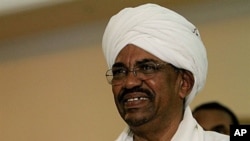Chinese officials are defending their approach to engagement with Africa, saying embargoes and sanctions against Sudan and other brutal African governments do not work. The country’s former envoy to Sudan's conflict-torn Darfur region, Liu Guijin says China is offering a new type of engagement with Africa based on equality and mutual benefit.
Sudan President al-Bashir visits China next week
China's special envoy for Africa Affairs, Liu Guijin, insists China will not repeat the mistakes of former colonial powers in Africa and will build long-lasting legacies that benefit ordinary Africans.
Liu spoke to journalists ahead of next week’s visit to China by President Omar Hassan al-Bashir of Sudan, who is wanted by the International Criminal Court on charges of genocide, crimes against humanity and war crimes in Sudan’s western Darfur region.
Liu dismissed claims Beijing is acting irresponsibly in inviting al-Bashir and insisted China is putting pressure on both sides in Sudan to end the latest outbreak of violence that threatens a landmark peace agreement.
“If you genuinely wish to resolve problems there, conflicts there, on the ground, simply resorting to embargoes or sanctions will not solve the problems. That has been proved with much evidence. That’s why China has a kind of new type of engagement with Africa - and that is built on equality and mutual benefit kind of arrangement,” Liu stated.
China's interest in Sudan
Sudan's oil-rich south splits from the north on July 9th to form an independent country, and China has already embarked on engagement with the new administration. China is also Sudan’s biggest arms supplier. President al-Bashir is expected to discuss Chinese investments in Sudan during his visit next week.
Liu’s briefing Thursday followed recent criticism of China’s policies in Africa from U.S. Secretary of State Hillary Clinton. Last week Clinton warned African leaders in Zambia about the perils of creeping "new colonialism" led by China.
She said that she is concerned that China's investment practices in Africa have not always been consistent with international norms of transparency and good governance. She also said that China has not always utilized the talents of the African people in pursuing its business interests.
Liu described Clinton’s warning as unreasonable and unfounded. “We try to give advice to African countries or try to reason out what they need to do. We try to analyze the situation together, try to engage with them from an equal footing. I think that sometimes this works, if not on all the time, it does work,” he said.
He says Chinese investment now accounts for 20 percent of Africa’s GDP.
Trade between China and Africa grew from $20 billion in 2001 to more than $120 billion in 2009, while direct Chinese investment on the continent has risen from under $500 million in 2003 to more than $9 billion in 2009.




